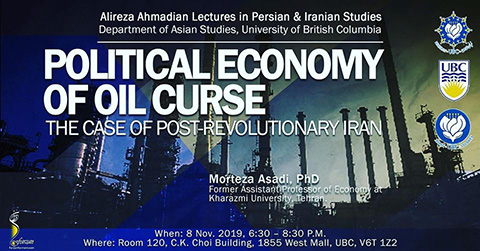

اقتصاد سیاسیِ استبداد نفتی: پروندهٔ ایران پس از انقلاب
سخنران: دکتر مرتضی اسدی، محقق مدعو در دانشکده مطالعات بینالملل، دانشگاه سایمون فریزر، استادیار سابق اقتصاد دانشگاه خوارزمی، تهران
نقش درآمدهای نفتی در بسیاری از کشورهای غیردموکراتیک در سراسر جهان موضوعی چالشبرانگیز برای مطالعات توسعه در اقتصادهای مبتنی بر نفت بوده است. بسیاری نفت را «منبع نفرین» میدانند که میتواند منجر به تمرکز قدرت و کاهش رشد پایدار شود. از سوی دیگر، برخی از اقتصاددانان بر عامل نهادی بهعنوان عامل اصلی توسعهنیافتگی سیاسی و اقتصادی تمرکز میکنند. در این سخنرانی با استفاده از تحلیل دادههای تابلویی، نقش نفت و سایر عوامل نهادی پشت ساختار سیاسی بررسی میشود. نتایج این مطالعه میتواند به برنامهریزی ملی کمک کند تا بر دموکراتیزه شدن قدرت بهعنوان یک اولویت تمرکز کند یا وابستگی دولت به نفت را در ساختار سیاسی و نهادی حاکم رد کند.
The role of oil revenues in many non-democratic countries around the world have been a challenging topic for development studies in oil-based economies. Much literature considers oil as a “resource curse” that may lead to the concentration of power and lower sustained growth. On the other hand, some economists focus on the institutional factor as the main factor behind political and economic underdevelopment. In this talk, I attempt to examine the role of the oil and other institutional factors behind the political setup by using panel data analysis. The outcomes of the study could help the national planning to focus on the democratization of power as a priority or to rule out the oil dependency of the state within the prevailing political and institutional set-up. My main findings show that both factors (the oil and the institutions) contribute to slow-sustained growth, yet quantitative study shows institutions to serve as more influential factors in twenty oil-based economies in general, including Iran. The question remains as to whether any specified country can be an exceptional case if there is no democratic movement in the society.
Speaker: Morteza Asadi, Ph.D. and former Assistant Professor of Economy at Kharazmi University, Tehran.
Should you have any questions, please contact the Department of Asian Studies at Asian.Studies@ubc.ca.